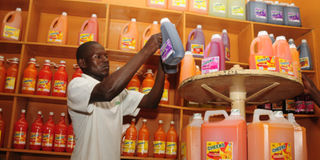Delight juice manufacturer diversifies into other businesses

An employee arranges packed Cheers juice at the factory.
What you need to know:
About Shs250,000 - an equivalent of $100- was enough for Nyamahunge to venture into the juice making business.
If there is any validity to seeing “a woman’s touch” in operating a key beverage company, it is illustrated by Delight Limited’s managing director Julian Nyamahunge Omalla.
Just like any other entrepreneur, Nyamahunge is not afraid to try out anything. With nearly two decades of experience in business, Nyamahunge has mastered the art of processing juice from her mother.
The professional food scientist nearly lost everything more than a decade ago but she soldiered on.
“I am not regretting anything. I am happy that I stuck in business.”
She told Prosper magazine in an interview last week that she employs about 300 people across all her operations.
The number fell from 500 to 300 after scaling down her operations in South Sudan following the war/insurgency there.
She supplies juice, processed food and cereals in Uganda and other countries such as South Sudan.
Start-up and initial capital
After saving about Shs250,000 ($100), Nyamahunge ventured into the juice making business.
She says that modest beginning later gave way to the establishment of Delight Ltd, one of the largest indigenous juice manufacturing companies in the country.
For nearly two decades now, Nyamahunge has been producing juice (soft drinks) named Cheers.
She believes not everything the country needs should be imported, for instance juice drinks.
This motivation coupled with her belief and measured expectations prompted her to venture into the soft drink business despite stiff competition then from Quencher, a popular juice drink manufactured in Kenya.
“I was at Kikuubo (market) and saw a lot of Quencher from Kenya being sold. I figured out that this is something that I could do. So, I started,” Nyamahunge said last week in an interview.
As the business picked up, the next challenge would be sustaining it, given that according to a World Bank survey, out of 10, only two businesses survive to their second birthday.
Diversifying business
She has started a 1,200 acre farm in Nwoya District, Northern Uganda, where she grows mangoes for her fruit producing factory.
She also hopes to increase the fruits from 600 acres to 800 acres as the remaining field goes for tree planting. In addition, she has a poultry farm, sugarcane plantations and bakery and trading outlets in South Sudan.
The poultry farm she says was particularly started after seeing children fight over eggs.
Loss
She regrets that as a result of that insurgency in South Sudan (which started in mid-December) she has lost at least Shs900 million, forcing her to scale down on her operations across the border—in South Sudan.
Avoiding rushing to borrow
Any business person should consider banks as the last resort when looking for sources of funds, she advises.
“First establish yourself then think of borrowing. When I borrowed, I noticed that my business was not growing as fast as I thought—it slowed me down,” she said. “I started with personal savings and I think that is the best way.”
Making a mark internationally
Nyamahunge is one of the most decorated woman entrepreneurs in the country and in the region as well.
This year, the manufacturer of the popular Cheers juice was named the country’s entrepreneur of the year by Ernst &Young in Nairobi under the emerging category. She was also named among the 100 most honoured women (making a mark) by Canadian Women.
She was among those that were presented with Labour Day presidential Awards. She was also among the women entrepreneurs recognised for corporate management by a Paris-based organisation where she scooped a gold award for quality.
Nyamahunge was also among the six African women entrepreneurs that were previously recognised by the World Bank following their tenacity to succeed amidst difficult conditions.
Estimated revenues
It is estimated (according to media reports) that her companies’ cash in an annual revenues ranges from Shs8 billion to Shs10 billion.
What others say about her
After being named the country’s entrepreneur of the year in the emerging category following her hard work in juice production, fruit farming, poultry farming, milling and real estate, the Ernst Young (EY) Chief Executive Officer, Gitahi Gachahi, described her as unsung heroine, given her role in creating employment and moving the economy forward.
EY country leader, Muhammed Ssempijja, said the role of entrepreneurship has become even more pivotal with rising levels of unemployment, especially among the productive age—youthful age, making the contribution of Nyamahunge even more critical.
Like Gachahi, Ssempijja shared a view that entrepreneurs must be celebrated because they are the gallant men and women who succeed against all odds.
“Entrepreneurs are the unsung heroes whose mission is creating wealth and building an improved working world,” Ssempijja said.
Challenges and plans
Exorbitant taxes, the U.S dollar volatility, increase in cheap substandard soft drinks and poverty especially among women are some of the challenges Nyamahunge grapples with.
This partly explains why she is diversifying into farming.
“You cannot compete with unregulated juice makers who do not even pay taxes yet your costs are high,” Nyamahunge said.
She advises other business people on how to manage. “Concentrate on your line of business. For my case, I am in foods and beverages.”
Plans
Her plan is to keep pushing the limits. “We hope to create more employment and develop the economy although all this is only possible with the right cooperation and partnerships.”




